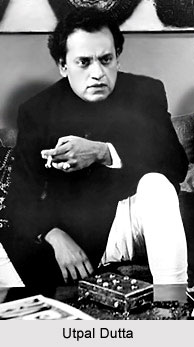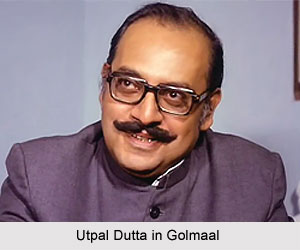 Utpal Dutta, born in Shillong, in the Indian state of Meghalaya in 1929, was a theatre personality and definitely one of the most versatile actors of India. In 1949, he graduated with English Literature Honours from the St. Xavier`s College, Kolkata, under University of Calcutta.
Utpal Dutta, born in Shillong, in the Indian state of Meghalaya in 1929, was a theatre personality and definitely one of the most versatile actors of India. In 1949, he graduated with English Literature Honours from the St. Xavier`s College, Kolkata, under University of Calcutta.
Early Life of Utpal Dutta
He honed his passion and craft by participating in English Theatre at St Xavier`s College and later formed a strong association with the `Shakespearean Theatre Company` led by Geoffrey Kendal. During their extensive tour through out India and Pakistan in 1947 and 1953, he learnt the basics of acting through the rigid discipline, and the strict routine of rehearsals and exercises. In 1949, Utpal Dutta renamed his group as `Little Theatre Group` (LTG), continued to stage plays by Ibsen, Rabindranath Tagore, Shaw and Gorky, but later decided to exclusively stage Bengali plays. Along with Hindi, English and Bengali he was also fluent in Spanish, German, French and Latin languages. He was also a founding member of Indian People`s Theatre Association (IPTA), an organization known for its leftist leaning.
Influence of Political in Utpal Dutta
Dutta was an active supporter of the Communist Party of India (Marxist), but left it after he started his theatre group. Through the Little Theatre Group, he established himself as the leading proponent of political theatre with a distinct leftist orientation. In 1959, the LTG secured the lease of Minerva Theatre, Kolkata. Angar (Fire), based on the exploitation of coal-miners, was showcased here in 1959. This was the first of a series of inspiring productions in which he aimed to impress the audiences through the use of lights, sound, music, visual grandeur, tense acting, and melodramatic situations. For the next decade, he staged several plays here.
In 1965, he was imprisoned by the Congress government in West Bengal, as the subversive message of his play Kallol (Sound of the Waves), based on the Royal Indian Navy Mutiny of 1946, portrayed a strong anti-government tone. This turned out to be his longest-running play at the Minerva.
Life in Theatre for Utpal Dutta
Manusher Adhikare (Of People`s Rights), his last memorable production at the Minerva, in 1968, staged as documentary drama, was a first of its kind in Bengali theatre.
He also popularised Indian street theatre by performing many street dramas at street-corners, in open spaces without any aid or embellishment before enormous crowds. The LTG`s ouster from the Minerva did not affect Dutta`s indomitable determination.
He renewed his group and renamed it as `People`s Little Theatre` in 1969. He staged great plays like Tiner Toloar (The Tin Sword) and Dushapner Nagari (Nightmare City), in different auditoriums. Surya-Shikar (Hunting the Sun) (1978), Maha-Bidroha (The Great Rebellion) (1989), Laal Durgo (Red Fort) (1990), and Janatar Aphim (Opiate of the People), (1990) were few of the most outstanding plays. Although Utpal Dutta was sincerely devoted to political theatre, but he continued to emphasise the significance of classics, directing dramas by Shakespeare, Rabindranath Tagore and Michael Madhusudan Dutta.
Near the end of 1960s, he was drawn towards Jatra, a form of Bengali folk drama. This had immense hold and influence over the masses in the rural areas. Dutta found it very helpful as a platform to spread his leftist belief. He wrote Jatra scripts, produced and acted in them, even formed his own Jatra group. Utpal was the author of twenty-two full-length plays, fifteen street plays, and nineteen Jatra scripts; acted in thousands of shows, and directed more than sixty productions.
Life in Cinema for Utpal Dutta
 He managed successful parallel careers as an intense theatre personality along with doing hilarious comic roles in Hindi cinema or Bollywood. He made a striking film debut as the hero in Michael Madhusudan in 1950, and attracted national attention for his role in Mrinal Sen`s Bhuvan Shome in 1969, followed by Ek Adhuri Kahani and Chorus, all by Mrinal Sen. This was followed by Palanka, Jukti Takko Ar Gappo and Satyajit Ray`s Agantuk, Jana Aranya, Joy Baba Felunath and Hirak Rajar Deshe. Dutta was also an extremely famous comic actor in Hindi cinemas. He acted in the comedy movies, most notable ones being Guddi, Golmaal, Swami, Amanush, Naram Garam, and Shaukeen.
He managed successful parallel careers as an intense theatre personality along with doing hilarious comic roles in Hindi cinema or Bollywood. He made a striking film debut as the hero in Michael Madhusudan in 1950, and attracted national attention for his role in Mrinal Sen`s Bhuvan Shome in 1969, followed by Ek Adhuri Kahani and Chorus, all by Mrinal Sen. This was followed by Palanka, Jukti Takko Ar Gappo and Satyajit Ray`s Agantuk, Jana Aranya, Joy Baba Felunath and Hirak Rajar Deshe. Dutta was also an extremely famous comic actor in Hindi cinemas. He acted in the comedy movies, most notable ones being Guddi, Golmaal, Swami, Amanush, Naram Garam, and Shaukeen.
He also directed a number of films like, Megh (1961), Ghoom Bhangar Gaan (1965), Jhar (1979), Baisakhi Megh (1981), Maa (1983) and Inquilab Ke Baad (1984).
Awards Received by Utpal Dutta
He was honoured National Film Award for Best Actor in 1970 and three Filmfare Awards for Best Comedian. In 1990, The Sangeet Natak Akademi, India`s National Academy of Music, Dance and Theatre, awarded him the Sangeet Natak Academy Fellowship for lifetime contribution to theatre.
Personal Life of Utpal Dutta
In 1960, Dutta married theatre and film actress Shobha Sen. Bishnupriya Dutta, their only daughter, is now a Professor of Theatre history in the School of Arts and Aesthetics at Jawaharlal Nehru University, Delhi
Utpal Dutta died in Kolkata, West Bengal on 19 August 1993.






